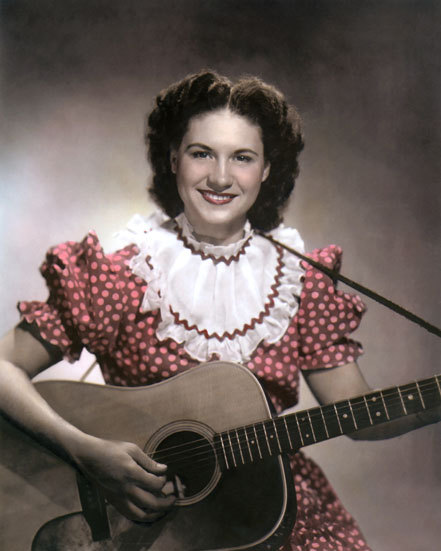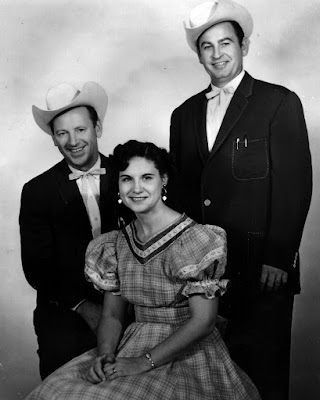Ellen Muriel Deason (August 30, 1919 – July 16, 2012), known professionally as Kitty Wells, was an American pioneering female country music singer. One of the few country stars born in Nashville, Kitty Wells had a string of hits from the '50s to the early '70s that earned her the title Queen of Country Music.
 There had been female singers in country music before – the indefatigably yodelling Patsy Montana; Molly O'Day, all gingham and tears; the regal Sara Carter – but they always required the presence of male protectors: singing husbands or an all-male backing band. In the 1940s and 50s, with the rise of such charismatic performers as Hank Williams and Johnny Cash, country music came to seem more and more like men's business. Wells changed all that with a single song, It Wasn't God Who Made Honky Tonk Angels (1952).
There had been female singers in country music before – the indefatigably yodelling Patsy Montana; Molly O'Day, all gingham and tears; the regal Sara Carter – but they always required the presence of male protectors: singing husbands or an all-male backing band. In the 1940s and 50s, with the rise of such charismatic performers as Hank Williams and Johnny Cash, country music came to seem more and more like men's business. Wells changed all that with a single song, It Wasn't God Who Made Honky Tonk Angels (1952).The road to that hit had been a long one. Born Ellen Muriel Deason in Nashville, Tennessee, she left school in her teens, in the Depression-hit early 30s, and took a job ironing shirts. She came from a musical family, had learned to sing and play guitar, and got some experience of performing on radio in a family quartet. In
1937 she married Johnnie Wright and sang with him and his sister. A couple of years later, Wright and Jack Anglin formed a duet act, Johnnie & Jack, and she toured with them in the then conventional role of the "girl singer". Up to that point she had been using her birth name, but Wright conferred on her the more resonant Kitty Wells, a name drawn from an old song.
1937 she married Johnnie Wright and sang with him and his sister. A couple of years later, Wright and Jack Anglin formed a duet act, Johnnie & Jack, and she toured with them in the then conventional role of the "girl singer". Up to that point she had been using her birth name, but Wright conferred on her the more resonant Kitty Wells, a name drawn from an old song.
After the Second World War, Johnnie, Jack and Kitty secured a place in the cast of the Louisiana Hayride, which at that time was second only to the Grand Ole Opry as a shop window of country music talent. In 1952, after Johnnie & Jack's hit recording Poison Love, the Opry stage was theirs too.
The Louisiana Hayride helped Johnnie & Jack land a record contract with RCA Records in 1949. That same year, Wells recorded some gospel tracks -- featuring Johnnie & Jack as instrumental support -- for RCA, but they were unsuccessful. Following those recordings, Wells was more or less retired for the next few years.
In 1952, Paul Cohen, an executive at Decca Records, approached Wells to record "It Wasn't God Who Made Honky Tonk Angels." Wells recorded the song and it became a smash hit, reaching number one in the summer and staying in that position for six weeks. It was set to the melody of both a tender old country song of
separated lovers, I'm Thinking Tonight of My Blue Eyes, and –
even more incongruously – Roy Acuff's scriptural hit of the 30s, The Great Speckled Bird. Later in 1952, she joined the Grand Ole Opry.
separated lovers, I'm Thinking Tonight of My Blue Eyes, and –
even more incongruously – Roy Acuff's scriptural hit of the 30s, The Great Speckled Bird. Later in 1952, she joined the Grand Ole Opry.
Wells issued another communiqué from the dark side of town, Paying for That Back Street Affair; sang duets with Red Foley such as One By One and As Long As I Live; and had further hits with Making Believe, I Can't Stop Loving You, Mommy for a Day and Heartbreak USA – songs that skilfully evoked both the lure of sin and the comfort of repentance. "On Wells's records," wrote the country-music historian Mary Bufwack, "sorrowful men and women acted out their emotional dramas through her plaintive vocals accompanied by a crying steel guitar."
By the end of the 50s, Wells had had more than 30 top 10 records in the Billboard country charts, and was billed as the "Queen of Country Music". Decca so valued her that they signed her to a lifetime contract, though after Will Your Lawyer Talk to God (1962) she was less of a presence in the country charts. But this mattered little to the female fans that she had gathered over the past decade: they turned up at her engagements, watched her syndicated TV programme and bought her book of favourite songs and recipes. Unlike some women in country music – and indeed unlike the heroines of many of her songs – she dressed conservatively and had a sober and scandal-
free life.
free life.
In 1976, Wells was inducted into the Country Music Hall of Fame, and with good reason. Kitty Wells broke down the doors for female country singers, paving the way for artists like Patsy Cline, Tammy Wynette, and Loretta Lynn. During the '80s, her activity slowed -- in addition to running a museum outside of Nashville, she toured with her husband, Johnnie, and frequently appeared on the Grand Ole Opry. In 1991, she was given a Lifetime Achievement Award from the Grammys. In July 2012 she died at home in Madison, Tennessee, from complications of a stroke; Kitty Wells was 92 years old.
(Compiled and edited from All Music & The Guardian)





